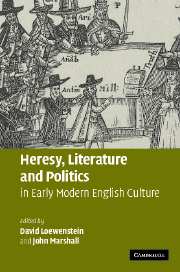Book contents
- Frontmatter
- Contents
- Acknowledgments
- Notes on contributors
- Introduction
- 1 Writing and the persecution of heretics in Henry VIII's England: The Examinations of Anne Askew
- 2 Anabaptism and anti-Anabaptism in the early English Reformation: defining Protestant heresy and orthodoxy during the reign of Edward VI
- 3 “Godlie matrons” and “loose-bodied dames”: heresy and gender in the Family of Love
- 4 Puritanism, Familism, and heresy in early Stuart England: the case of John Etherington revisited
- 5 A ticklish business: defining heresy and orthodoxy in the Puritan revolution
- 6 Thomas Edwards's Gangraena and heresiological traditions
- 7 “And if God was one of us”: Paul Best, John Biddle, and anti-Trinitarian heresy in seventeenth-century England
- 8 The road to George Hill: the heretical dynamic of Winstanley's early prose
- 9 Milton and the heretical priesthood of Christ
- 10 An Historical Narration Concerning Heresie: Thomas Hobbes, Thomas Barlow, and the Restoration debate over “heresy”
- 11 Defining and redefining heresy up to Locke's Letters Concerning Toleration
- 12 “Take heed of being too forward in imposinge on others”: orthodoxy and heresy in the Baxterian tradition
- Index
1 - Writing and the persecution of heretics in Henry VIII's England: The Examinations of Anne Askew
Published online by Cambridge University Press: 20 February 2010
- Frontmatter
- Contents
- Acknowledgments
- Notes on contributors
- Introduction
- 1 Writing and the persecution of heretics in Henry VIII's England: The Examinations of Anne Askew
- 2 Anabaptism and anti-Anabaptism in the early English Reformation: defining Protestant heresy and orthodoxy during the reign of Edward VI
- 3 “Godlie matrons” and “loose-bodied dames”: heresy and gender in the Family of Love
- 4 Puritanism, Familism, and heresy in early Stuart England: the case of John Etherington revisited
- 5 A ticklish business: defining heresy and orthodoxy in the Puritan revolution
- 6 Thomas Edwards's Gangraena and heresiological traditions
- 7 “And if God was one of us”: Paul Best, John Biddle, and anti-Trinitarian heresy in seventeenth-century England
- 8 The road to George Hill: the heretical dynamic of Winstanley's early prose
- 9 Milton and the heretical priesthood of Christ
- 10 An Historical Narration Concerning Heresie: Thomas Hobbes, Thomas Barlow, and the Restoration debate over “heresy”
- 11 Defining and redefining heresy up to Locke's Letters Concerning Toleration
- 12 “Take heed of being too forward in imposinge on others”: orthodoxy and heresy in the Baxterian tradition
- Index
Summary
For three years after 1543, Henry VIII had stopped burning heretics; although the persecution of heresy at the end of his reign was sporadic and unpredictable, the dangerous summer of 1546 witnessed the resumption of burnings of radical evangelicals. The most notorious, controversial victim of the king's savage heresy hunting – since women were less likely than men to be burned for heresy – was Anne Askew (1521–46). This young evangelical gentlewoman from a prominent Lincolnshire family and friend of reformist court ladies recorded, in a terse and vivid first-person narrative, her arraignment, interrogations, and persecution before she was burned on July 16 in Smithfield on a great stage before a great crowd; in that shocking spectacle, she died along with three other English evangelicals, including a gentleman and courtier named John Lascelles, who was one of Askew's likely teachers and was associated with a religious group engaged in seditious “proffecyes and other thinges styrringe to commotion against the Kings majestie.” The trial of Askew, sister of one of the king's gentlemen pensioners, was a political tactic by the conservative faction at court to discredit the reform-minded in high places, including the godly queen and humanist, Katherine Parr. The campaign to crack down on heresy was aimed not only at leaders of reform in the church and nation; it was also aimed at the royal court, where high-ranking women actively engaged in Bible reading and exegesis, as well as patronizing evangelicals, were suspected of contributing to the spread of radical evangelical doctrine.
- Type
- Chapter
- Information
- Publisher: Cambridge University PressPrint publication year: 2006
- 3
- Cited by

